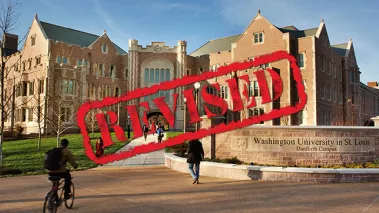Table of Contents
Speech Code of the Month: Washington University in St. Louis

FIRE announces its Speech Code of the Month for April 2013: Washington University in St. Louis (WUSTL). Specifically, WUSTL's Residence Life Policies and Procedures define "harassment" as:
any behavior or conduct that is injurious, or potentially injurious to a person's physical, emotional, or psychological well-being, as determined at the sole discretion of the University. Such behavior is subject to disciplinary action.
While many speech codes open the door to administrative abuse of discretion, few are so shameless about it. In fact, the only similar policy that comes to mind is Northeastern University's Appropriate Use Policy (PDF)—another former Speech Code of the Month—which bans the transmission of material that "in the sole judgment of the University is offensive."
If you really think about the wording of WUSTL's policy, it allows the administration to punish an almost unlimited amount of speech and expression. Any conduct that is even "potentially injurious" to a person's "emotional ... well-being," as determined at the sole discretion of the university? How is any student supposed to ascertain what the university means by these terms? On their face, they could mean anything from hurt feelings to serious emotional distress. And who gets to exercise the "sole discretion" of the university? Is it always the same person, or might it vary case by case, depending on the parties involved? If I were a student in WUSTL's residence halls, I would be afraid to engage in any rigorous or controversial debate for fear of running afoul of this exceptionally broad policy.
Although WUSTL is private, it promises its students freedom of expression. The introduction to the university's University Student Judicial Code (PDF) explicitly states:
Freedom of thought and expression is essential to the University's academic mission. Nothing in this Code should be construed to limit the free and open exchange of ideas and viewpoints, even if that exchange proves to be offensive, distasteful, disturbing, or denigrating to some.
How are we to square this commitment with a policy that threatens disciplinary action for any speech that has even the potential to leave another student emotionally upset? We can't, of course. The residence hall policy is wholly inconsistent with the university's commitment to free speech, and it should be revised immediately.
For these reasons, Washington University in St. Louis is our April 2013 Speech Code of the Month. If you believe that your college's or university's policy should be a Speech Code of the Month, please email speechcodes@thefire.org with a link to the policy and a brief description of why you think attention should be drawn to this code. If you are a current college student or faculty member interested in free speech, consider joining FIRE's Campus Freedom Network, an organization of college faculty members and students dedicated to advancing individual liberties on their campuses. You also can add FIRE's Speech Code of the Month widget to your blog or website and help shed some much-needed sunlight on these repressive policies.
Recent Articles
FIRE’s award-winning Newsdesk covers the free speech news you need to stay informed.

FIRE to SCOTUS: TikTok ban violates Americans' First Amendment rights

California and other states are rushing to regulate AI. This is what they’re missing

One day after FIRE lawsuit, Congress passes changes to filming permits in national parks
